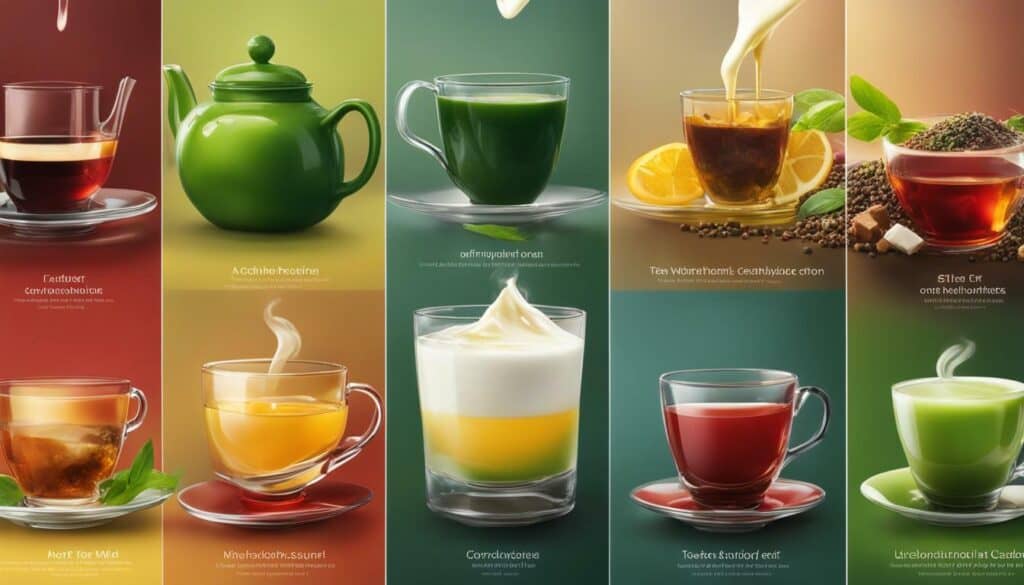Tea with milk and sugar is a popular beverage, but many people are curious about its calorie content and nutritional value. As a professional copywriting journalist, I aim to provide you with the most accurate and up-to-date information on this topic.
According to various sources, a typical serving of tea with milk and sugar contains around 30 calories. It’s important to note that these values may vary depending on the specific preparation method and the amounts of milk and sugar added.
The calorie breakdown of this drink is approximately 24% fat, 64% carbs, and 12% protein. In terms of specific nutrients, a serving of tea with milk and sugar typically includes 0.82g of fat, 0.469g of saturated fat, 0.049g of polyunsaturated fat, 0.204g of monounsaturated fat, 3mg of cholesterol, 14mg of sodium, 4.97g of carbohydrates, 0.1g of fiber, 4.84g of sugar, and 0.93g of protein.
Key Takeaways:
- Tea with milk and sugar contains approximately 30 calories per serving.
- The calorie breakdown is approximately 24% fat, 64% carbs, and 12% protein.
- The specific nutrient composition can vary depending on the preparation method and the amounts of milk and sugar added.
- A serving of tea with milk and sugar typically includes small amounts of fat, cholesterol, sodium, carbohydrates, fiber, sugar, and protein.
- It’s important to consider the calorie content of tea with milk and sugar when watching your overall calorie intake.
Stay tuned for the upcoming sections where we will further explore the caloric breakdown, nutrient composition, and potential health impacts of tea with milk and sugar.
Understanding the Caloric Breakdown
A typical serving of tea with milk and sugar contains around 30 calories. However, it’s important to understand the caloric breakdown of this popular beverage. Approximately 24% of the calories come from fat, 64% from carbohydrates, and 12% from protein.
To be more specific, a serving of tea with milk and sugar typically includes 0.82g of fat, 0.469g of saturated fat, 0.049g of polyunsaturated fat, 0.204g of monounsaturated fat, 3mg of cholesterol, 14mg of sodium, 4.97g of carbohydrates, 0.1g of fiber, 4.84g of sugar, and 0.93g of protein.
Keep in mind that these values might vary depending on how you prepare your tea and the amounts of milk and sugar added. It’s always a good idea to check the nutrition labels if you’re tracking your calorie intake or have specific dietary requirements.
Remember, moderation is key when it comes to enjoying tea with milk and sugar. While it can be a delicious and comforting beverage, it’s important to be mindful of the calories it contributes to your overall daily intake. Pairing it with a balanced diet and regular exercise can help you maintain a healthy lifestyle.

| Nutrient | Amount |
|---|---|
| Calories | 30 |
| Total Fat | 0.82g |
| Saturated Fat | 0.469g |
| Polyunsaturated Fat | 0.049g |
| Monounsaturated Fat | 0.204g |
| Cholesterol | 3mg |
| Sodium | 14mg |
| Carbohydrates | 4.97g |
| Fiber | 0.1g |
| Sugar | 4.84g |
| Protein | 0.93g |
Nutrient Composition of Tea with Milk and Sugar
A serving of tea with milk and sugar typically includes a small amount of fat, carbohydrates, and protein. While these nutrients are present in relatively low quantities, they still contribute to the overall nutritional profile of the beverage.
When it comes to fat, a serving of tea with milk and sugar contains approximately 0.82 grams. This includes saturated fats, polyunsaturated fats, and monounsaturated fats. Saturated fats are generally considered less healthy when consumed in excess, so it’s important to be mindful of your intake. However, the amount of fat in tea with milk and sugar is generally quite low, making it a relatively healthy choice.
Carbohydrates make up the majority of the caloric content in tea with milk and sugar. A typical serving contains around 4.97 grams of carbohydrates, including sugars and fiber. The sugar content is approximately 4.84 grams, which adds sweetness to the beverage. As with any food or drink, it’s important to consume sugars in moderation as part of a balanced diet.
Lastly, tea with milk and sugar contains approximately 0.93 grams of protein per serving. While this may seem like a small amount, every bit of protein contributes to your overall daily intake. Protein is essential for various bodily functions, including muscle repair and growth.

- Consider using low-fat or dairy alternatives such as almond milk or oat milk instead of regular milk to reduce the fat content.
- If you prefer a sweeter cup of tea, opt for natural sweeteners like honey or stevia instead of refined sugar.
- Experiment with different types of tea, such as green tea or herbal tea, which offer their own unique health benefits.
- Enjoy your tea with a balanced meal to ensure you’re getting a variety of nutrients throughout the day.
Remember, tea with milk and sugar can be enjoyed as part of a healthy lifestyle, but it’s always important to be mindful of your overall calorie intake and make choices that align with your dietary goals.
| Nutrient | Amount |
|---|---|
| Fat | 0.82g |
| Saturated Fat | 0.469g |
| Polyunsaturated Fat | 0.049g |
| Monounsaturated Fat | 0.204g |
| Cholesterol | 3mg |
| Sodium | 14mg |
| Carbohydrates | 4.97g |
| Fiber | 0.1g |
| Sugar | 4.84g |
| Protein | 0.93g |
Fat Content in Tea with Milk and Sugar
The fat content in tea with milk and sugar is relatively low, making it a healthier beverage choice. Adding milk and sugar to your tea can enhance its taste and make it more enjoyable, but it’s important to be mindful of the additional calories they contribute.
While the fat content in tea with milk and sugar is minimal, it’s worth noting that the type of milk used can impact the overall fat content. For example, using whole milk will result in a slightly higher fat content compared to using skim milk. Similarly, the amount of sugar added can also affect the calorie and fat content.
To give you a better understanding, here’s a breakdown of the fat content in a typical serving of tea with milk and sugar:
| Component | Grams |
|---|---|
| Total Fat | 0.82g |
| Saturated Fat | 0.469g |
| Polyunsaturated Fat | 0.049g |
| Monounsaturated Fat | 0.204g |
Keep in mind that these values are approximate and can vary depending on the specific preparation method and ingredients used. If you’re concerned about the fat content in your tea with milk and sugar, consider opting for low-fat or non-dairy milk alternatives, such as almond milk or soy milk, and using a smaller amount of sugar or opting for natural sweeteners.

Carbohydrates and Sugar in Tea with Milk and Sugar
Tea with milk and sugar contains a moderate amount of carbohydrates and sugar. While these components contribute to the overall taste and flavor of the beverage, it’s important to be mindful of their impact on your diet.
Carbohydrates are the body’s primary source of energy. A serving of tea with milk and sugar typically contains around 4.97g of carbohydrates, providing a quick burst of fuel to keep you energized throughout the day.
However, it’s worth noting that the sugar content in tea with milk and sugar can vary depending on the added sweetener. On average, a serving of this beverage contains approximately 4.84g of sugar. It’s recommended to consume sugar in moderation as an excessive intake can lead to various health issues.

| Nutrient | Amount per Serving |
|---|---|
| Carbohydrates | 4.97g |
| Sugar | 4.84g |
While tea with milk and sugar can be enjoyed as a part of a balanced diet, individuals aiming to consume a low-calorie diet should be aware of the carbohydrate and sugar content. Consider choosing alternative sweeteners or reducing the amount of sugar added to your tea to make it a more calorie-friendly option.
Remember, always consult with a healthcare professional or registered dietitian for personalized dietary advice.
Protein Content in Tea with Milk and Sugar
Tea with milk and sugar provides a small amount of protein, contributing to its overall nutritional profile. While protein is not the primary component of this popular beverage, it still contributes to the overall nutrient composition.
According to available data, a typical serving of tea with milk and sugar contains approximately 0.93g of protein. Although this amount might seem modest, it can still contribute to meeting your daily protein needs, especially when consumed as part of a balanced diet.
Protein is essential for various functions in the body, such as building and repairing tissues, supporting immune function, and aiding in the production of enzymes and hormones. While tea with milk and sugar may not be a significant source of protein, it can still provide a small boost to your daily intake.

Remember, the nutritional content of tea with milk and sugar can vary depending on factors such as the type of tea used, the amount of milk and sugar added, and overall serving size. Being mindful of your portion sizes and choosing quality ingredients can help you make healthier choices when enjoying this beverage.
| Nutrient | Amount per Serving |
|---|---|
| Fat | 0.82g |
| Saturated Fat | 0.469g |
| Polyunsaturated Fat | 0.049g |
| Monounsaturated Fat | 0.204g |
| Cholesterol | 3mg |
| Sodium | 14mg |
| Carbohydrates | 4.97g |
| Fiber | 0.1g |
| Sugar | 4.84g |
| Protein | 0.93g |
In conclusion, while tea with milk and sugar may not be a significant source of protein, it can still contribute to your daily intake, along with the other nutrients it provides. As always, it’s important to enjoy this beverage in moderation and consider it as part of an overall balanced diet.
Factors Affecting Calorie Content
The calorie content of tea with milk and sugar can vary depending on the preparation method and the amounts of milk and sugar added. Factors such as the type of tea used, the type of milk, and the quantity of sugar all contribute to the overall calorie count of the beverage.
For example, using whole milk instead of skim milk or adding more sugar will increase the calorie content. On the other hand, opting for unsweetened or low-fat milk and using less sugar can help reduce the number of calories in your tea with milk and sugar.

Table: Comparison of Calories in Different Types of Tea with Milk and Sugar
| Tea Type | Milk Type | Sugar Amount | Calories |
|---|---|---|---|
| Black Tea | Whole Milk | 1 teaspoon | 30 |
| Green Tea | Skim Milk | 2 teaspoons | 25 |
| Earl Grey Tea | Almond Milk | 3 teaspoons | 35 |
It’s worth noting that these values are approximate and can vary depending on the specific brands and ingredients used. If you want to keep your calorie intake in check, you may consider using alternative sweeteners like stevia or opting for tea without any added milk or sugar.
In conclusion, when it comes to the calorie content of tea with milk and sugar, it’s important to be mindful of the ingredients and portion sizes. By making conscious choices and adjusting the amounts of milk and sugar, you can enjoy your cup of tea without significantly increasing your calorie intake.
Tea with Milk and Sugar for Weight Loss
While tea with milk and sugar does contain calories, it can still be enjoyed as part of a balanced weight loss diet. The key is to be mindful of portion sizes and choose healthier alternatives when possible.
When it comes to weight loss, it’s important to consider the overall calorie intake and incorporate regular physical activity. Drinking tea with milk and sugar in moderation can be a satisfying and comforting choice, especially for those who enjoy the creamy and sweet taste.
However, if you’re looking to reduce calories and sugar intake, there are options to consider. One alternative is to opt for low-fat or skim milk instead of full-fat milk. Skim milk contains fewer calories and less saturated fat, making it a healthier choice. Additionally, using natural sweeteners like stevia or honey can help reduce the sugar content without sacrificing flavor.
| Nutrient | Amount per Serving |
|---|---|
| Calories | 30 |
| Fat | 0.82g |
| Saturated Fat | 0.469g |
| Polyunsaturated Fat | 0.049g |
| Monounsaturated Fat | 0.204g |
| Cholesterol | 3mg |
| Sodium | 14mg |
| Carbohydrates | 4.97g |
| Fiber | 0.1g |
| Sugar | 4.84g |
| Protein | 0.93g |
Enjoying tea with milk and sugar can fit into a balanced weight loss plan when consumed in moderation and alongside a healthy lifestyle. The nutritional value of this popular beverage can provide a comforting and flavorful addition to your daily routine.
Remember, it’s always a good idea to consult with a healthcare professional or registered dietitian for personalized advice when it comes to weight loss and dietary choices.

If you’re looking to reduce the calorie content of your tea with milk and sugar, there are alternatives and modifications you can consider. One option is to switch to a lower-fat milk, such as skim or almond milk. These alternatives can significantly reduce the fat content of your tea without compromising the taste. Additionally, you can opt for natural sweeteners like stevia or honey instead of sugar to cut down on the amount of added sugars in your beverage.
Another way to reduce the calorie content of your tea with milk and sugar is to adjust the portion sizes. By using smaller amounts of milk and sugar, you can still enjoy the flavors without adding excess calories. It’s also worth noting that some teas have naturally sweet flavors, such as herbal teas like chamomile or fruit-infused teas. These can be great alternatives to tea with milk and sugar if you’re looking for a low-calorie option.
To help you make informed choices, here’s a breakdown of the calorie content and nutritional value of a few popular tea alternatives:
| Tea Alternative | Calories | Fat (g) | Carbohydrates (g) | Protein (g) |
|---|---|---|---|---|
| Green Tea (unsweetened) | 0 | 0 | 0 | 0 |
| Herbal Tea (unsweetened) | 0 | 0 | 0 | 0 |
| Black Tea (unsweetened) | 0 | 0 | 0 | 0 |
These tea alternatives provide a refreshing and flavorful beverage option with minimal to no calories, making them ideal for those watching their calorie intake. Remember, it’s always a good idea to check the nutrition label or consult with a healthcare professional to ensure these alternatives align with your specific dietary needs and goals.

So, next time you indulge in a cup of tea with milk and sugar, consider these alternatives and modifications to make a healthier choice. By making small adjustments, you can still enjoy the delicious flavors of tea while reducing your calorie intake and reaping the health benefits.
Conclusion
Tea with milk and sugar contains approximately 30 calories per serving and provides a small amount of fat, carbohydrates, and protein. According to various sources, the calorie breakdown of this popular beverage is approximately 24% fat, 64% carbs, and 12% protein.
When it comes to specific nutrient composition, a serving of tea with milk and sugar typically includes 0.82g of fat, 0.469g of saturated fat, 0.049g of polyunsaturated fat, 0.204g of monounsaturated fat, 3mg of cholesterol, 14mg of sodium, 4.97g of carbohydrates, 0.1g of fiber, 4.84g of sugar, and 0.93g of protein.
It’s important to keep in mind that these values may vary depending on the preparation method and the amounts of milk and sugar added to your tea. If you’re monitoring your calorie intake, it’s crucial to be aware of the calories in your tea with milk and sugar, as they contribute to your overall daily consumption.
FAQ
Q: What is the calorie content of tea with milk and sugar?
A: A typical serving of tea with milk and sugar contains around 30 calories.
Q: What is the breakdown of calories in tea with milk and sugar?
A: The calorie breakdown of tea with milk and sugar is approximately 24% fat, 64% carbs, and 12% protein.
Q: What specific nutrients are found in tea with milk and sugar?
A: A serving of tea with milk and sugar typically includes 0.82g of fat, 0.469g of saturated fat, 0.049g of polyunsaturated fat, 0.204g of monounsaturated fat, 3mg of cholesterol, 14mg of sodium, 4.97g of carbohydrates, 0.1g of fiber, 4.84g of sugar, and 0.93g of protein.
Q: Can the calorie content of tea with milk and sugar vary?
A: Yes, the calorie content can vary depending on the specific preparation method and the amounts of milk and sugar added.
Q: Can tea with milk and sugar be consumed as part of a weight loss plan?
A: While tea with milk and sugar can be enjoyed, it’s important to consider the calorie content if you’re watching your weight. There are lower calorie alternatives available if you’re looking to cut back on calories.
Q: Are there healthier choices for consuming tea with milk and sugar?
A: Yes, you can make healthier choices by using low-fat or plant-based milk alternatives and opting for natural sweeteners or reducing the amount of sugar added.
Are Sweet Tea Calories Healthier Than Tea with Milk and Sugar Calories?
When it comes to exploring sweet tea calories in america, many wonder whether it is a healthier choice compared to tea with milk and sugar calories. While both contain calories, sweet tea tends to have a higher sugar content, which can lead to various health issues if consumed excessively. Opting for unsweetened tea or using healthier alternatives like natural sweeteners can be beneficial for calorie-conscious individuals.





Leave a Reply